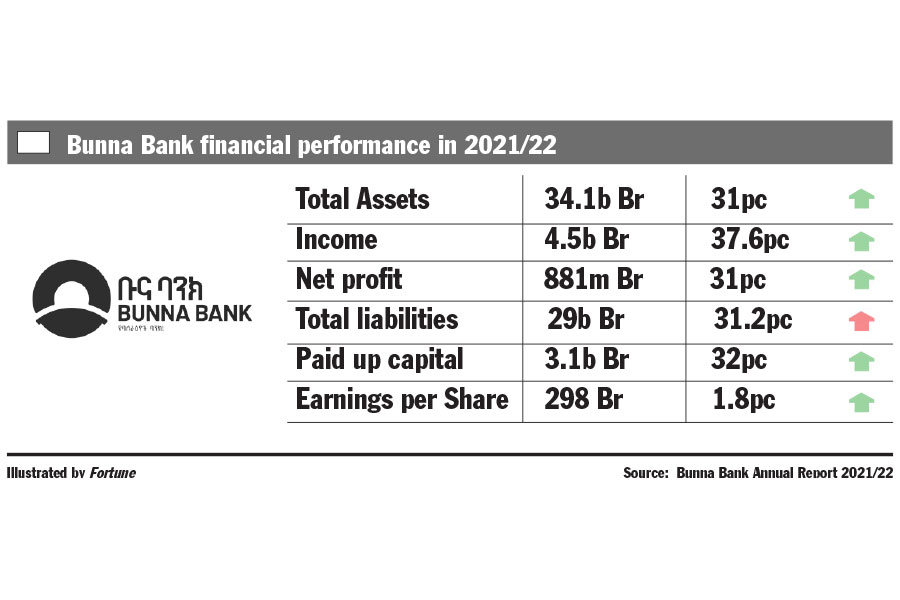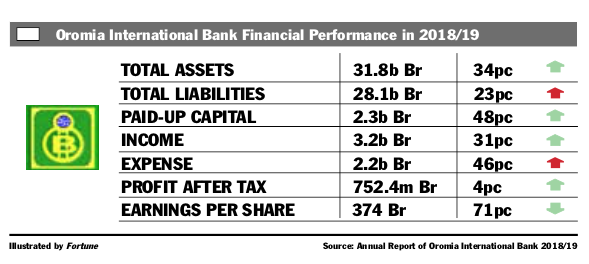
Radar | Jun 18,2022
Nov 4 , 2023
By Selome Getachew
The banking landscape has exhibited a peculiar dichotomy recently. On one end, there is an applaudable growth in deposit accounts and value; on the other, a looming crisis brought about by non-performing assets.
The latest data from the National Bank of Ethiopia (NBE) paints a spirited picture, with deposit accounts soaring to 129.52 million in June 2023, up from 98.59 million the previous year. This has prompted many banks to announce their achievements to shareholders with justifiable pride.
Yet, beneath the impressive numbers lies a troubling problem: a growing default on loan repayments. The magnitude of this problem has driven many banks to reconsider their loan strategies, particularly those meant for export advances and pre-shipment guarantees. Disturbingly, several banks are now demanding up-front payments, running into hundreds of millions, as punitive measures against erring companies. This aggressive posture derives from the latter's failure to remit foreign currency as promised against their approved loans.
Experts pin the repayment failure on a well-entrenched malpractice: diversion of bank-provided funds. Many corporate borrowers have institutionalised the unethical habit of maintaining dual financial statements – one for the bank's loan appraisal and another for annual tax assessments. With bank-approved business plans becoming mere paper formalities, coupled with a lacklustre monitoring system post-loan disbursement, the system is rife for manipulation.
Financial malpractice is not just confined to financial statements.
The property market has become a playground for diverting funds earmarked for business ventures. This has triggered a volatile property price regime, rare in other markets, with property prices in prime locations in Addis Abeba soaring to unimaginable highs. In a startling revelation, the price for a square meter of property in the city was sold at a mind-boggling 187 times the threshold price set by municipal authorities in a land lease auction issued by the City Administration
The question that should intrigue: with such exorbitant real estate prices and the evident economic instability, what is fuelling this demand?
Perhaps the answer lies overseas, with Ethiopians emerging as one of the leading groups of real estate magnates in Dubai's luxurious property market.
Ironically, the core of Ethiopia's economic strategy seems somewhat sidelined. The lion's share of the disbursed loans is not channelled towards the manufacturing sector – which should have been the primary focus. Instead, the ease of import businesses and oft-mismanaged export ventures dominate, leading to a skewed loan distribution. This, combined with a banking system more focused on loan repayment than the actual end-use of the funds, creates a precarious situation.
Signs of this financial recklessness are now beginning to manifest in the real estate market. With barely checked borrowing practices and the diversion of funds into property, the market is inflated artificially, making it susceptible to drastic corrections. The property bubble, if it bursts, could lead to significant financial chaos.
Acknowledging the gravity of the situation, regulators at the central bank have stepped in, rolling out a directive targeting squarely the reigning in inflation and modulating the loan-to-deposit ratio. This empowers them to keep a stringent check on loan approvals. Initial reports indicate the directive is working. The frantic pace of property transactions has cooled, with property prices in the higher bracket showing a marked decline. But it is not all rosy.
The default in repayment has inadvertently led to a liquidity crunch for several banks. Some even resorted to a bailout from the central bank, albeit at a stiff 18pc interest.
This ongoing financial reel reveals a lack of transparency in the business world. The widespread misallocation of loans, unchecked by the lenders, puts the country's economic stability at risk. For a sustainable financial environment, there should be a pressing need for rigorous oversight mechanisms. These should promote financial discipline, transparency, and the judicious use of borrowed funds.
PUBLISHED ON
Nov 04,2023 [ VOL
24 , NO
1227]


Radar | Jun 18,2022

Fortune News | May 20,2023

Fortune News | May 08,2021

Fortune News | Mar 14,2020

Radar | Dec 15,2024

Fortune News | Feb 23,2019

Radar | Jun 04,2022

Fortune News | Sep 01,2021

Radar | Oct 20,2024

Fortune News | Apr 24,2021

My Opinion | 132045 Views | Aug 14,2021

My Opinion | 128441 Views | Aug 21,2021

My Opinion | 126368 Views | Sep 10,2021

My Opinion | 123991 Views | Aug 07,2021





Dec 22 , 2024 . By TIZITA SHEWAFERAW
Charged with transforming colossal state-owned enterprises into modern and competitiv...

Aug 18 , 2024 . By AKSAH ITALO
Although predictable Yonas Zerihun's job in the ride-hailing service is not immune to...

Jul 28 , 2024 . By TIZITA SHEWAFERAW
Unhabitual, perhaps too many, Samuel Gebreyohannes, 38, used to occasionally enjoy a couple of beers at breakfast. However, he recently swit...

Jul 13 , 2024 . By AKSAH ITALO
Investors who rely on tractors, trucks, and field vehicles for commuting, transporting commodities, and f...

Jul 12 , 2025
Political leaders and their policy advisors often promise great leaps forward, yet th...

Jul 5 , 2025
Six years ago, Ethiopia was the darling of international liberal commentators. A year...

Jun 28 , 2025
Meseret Damtie, the assertive auditor general, has never been shy about naming names...

Jun 21 , 2025
A well-worn adage says, “Budget is not destiny, but it is direction.” Examining t...

Jul 13 , 2025 . By YITBAREK GETACHEW
The Addis Abeba City Revenue Bureau has introduced a new directive set to reshape how...

Jul 13 , 2025 . By BEZAWIT HULUAGER
Addis Abeba has approved a record 350 billion Br budget for the 2025/26 fiscal year,...

Jul 13 , 2025 . By RUTH BERHANU
The Addis Abeba Revenue Bureau has scrapped a value-added tax (VAT) on unprocessed ve...

Jul 13 , 2025 . By NAHOM AYELE
Federal lawmakers have finally brought closure to a protracted and contentious tax de...